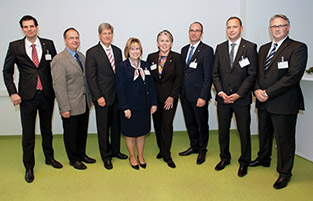
ASTM Visits Austrian Standards Institute
Nov. 5, 2013, was "ASTM Day" at the headquarters of the Austrian Standards Institute in Vienna, where ASTM International headlined an installment of the Austrian special event series, "Standards Around the World."
The Austrian Standards Institute, known as Austrian Standards, invited ASTM to participate in the program, which provides a platform for information exchange regarding internationally relevant standards. The event, "Destination USA - ASTM International," featured James A. Thomas, ASTM president, and Katharine Morgan, ASTM vice president of technical committee operations, along with their Austrian counterparts.
Elisabeth Stampfl-Blaha, managing director of Austrian Standards, opened the program with insights into the impressive increase in Austrian exports over the last three decades, with the United States among the countries reflected in Austria's export uptick. Other speakers represented various divisions within Austrian Standards as well as Austria's Economic Chambers. The audience comprised representatives from industry and government in Austria as well as ASTM members residing in Austria.
A long-standing and successful cooperation links Austria with ASTM International. More than 50 ASTM standards are referenced in Austrian regulations, and some 40 individuals from Austria participate on 23 different ASTM technical committees. Many of Austria's main export commodities are reflected in the fields covered by ASTM standards such as metallurgical products, chemicals, textiles and more.
A particularly timely topic for the ASTM installment of the Standards Around the World series was the proposed Transatlantic Trade and Investment Partnership. TTIP is an agreement under negotiation between the United States and the European Union intended to facilitate trade and boost economic growth for both parties. In 2012, the trade volume in goods and services between the two economies totaled $1.08 trillion.
ASTM President Thomas noted that the United States and Europe are each other's largest economic partner and therefore an efficient marketplace is needed. International standards, regardless of their origins, that are technically advanced and market relevant can best support a liberalized trading system.
 SN Home
SN Home Archive
Archive Advertisers
Advertisers Masthead
Masthead RateCard
RateCard Subscribe
Subscribe Email Editor
Email Editor